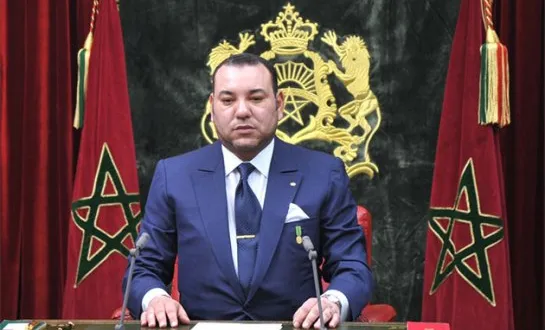
King Mohammed VI has outlined a roadmap for achieving a comprehensive and sustainable development in Africa,based on four key pillars,namely changing the model used for development financing; creating an institutional,economic,and social environment conducive to development; increasing and stimulating intra-African trade; and increasing the value of the continent’s abundant natural resources.
These pillars were detailed in a message the Monarch addressed to participants at the 2025 edition of the “Ibrahim Governance Weekend”,which opened on Sunday in Marrakech.
The Monarch also dealt in his message,that was read out by Royal Advisor André Azoulay,with the financing of development in Africa,saying that this financing remains a major challenge which requires innovative,solidarity-based solutions tailored to the continent’s realities,and which necessitates joint efforts “at the national,regional,and global levels to bridge the gap in development financing,and contribute to building the emerging Africa we all yearn for.”
The mobilization of funds,which remains a prerequisite for achieving sustainable and inclusive growth,is an essential requirement for the valorization and structural transformation of African economies,King Mohammed VI stated,stressing that without adequate financing tailored to its specific needs,Africa will not be able to implement its reforms and development projects in an optimal way.
The Monarch insisted that development financing in Africa needs to mobilize greater domestic resources,and implement structural reforms to strengthen the macroeconomic framework.
“It must also promote innovative development financing mechanisms,and effectively leverage remittances from African communities abroad”,the Sovereign added,pointing out that Africa can no longer rely solely on public spending for development,or debt-generating external financing.
Concerning the creation of an institutional,and social environment conducive to development,the King stressed the importance of offering investment and entrepreneurship incentives and therefore create job opportunities,by accelerating reforms relating to good governance in particular,improving the business climate,enhancing transparency,protecting investors,stamping out corruption,and making the justice system more ethical.
As for increasing and stimulating intra-African trade the Sovereign recalled that the continent’s economic integration is no longer just an option but an absolute necessity in a globalized world,in which Africa’s share of global trade does not exceed 3%. Similarly,intra-African trade represents 16% of the continent’s total volume of trade,compared to 60% for Europe,and 50% for Asia.
The launch of the African Continental Free Trade Area can,the King argued,offer good opportunities to boost intra-African trade and serve as a catalyst for growth and sustainable development on the continent. It can contribute to greater industrialization on the continent,enhance the resilience of African economies,and help attract investment.
As for the increment of the value of the continent’s abundant natural resources,the Sovereign noted that “since Africa accounts for 40% of the world’s reserves of raw materials,and for 30% of the planet’s strategic minerals,in addition to having significant mineral,energy,water,agricultural,and biological resources,we can no longer allow our continent to be a mere exporter of raw materials.”
The “Ibrahim Governance Weekend”,the flagship event of the Mo Ibrahim Foundation,held annually in a different African country,highlights the critical role of Africa’s resources in accelerating development and transforming the continent’s position in the new global economy.
The program of this year’s edition,which runs until June 3,features an opening day focused on current leadership challenges in Africa and worldwide,in addition to the Ibrahim Forum 2025,held under the theme “Financing the Africa We Want.”
The Forum features plenary sessions on Africa’s priorities,resource mobilization,reform of the multilateral financial system,and investment across the continent.
Established in 2006,the Mo Ibrahim Foundation aims to strengthen Africa’s voice on major global issues and emphasizes the importance of governance and leadership.
The Foundation provides data and analysis on the continent’s challenges,brings together key stakeholders for dialogue,and supports initiatives aimed at improving leadership and governance.
The time has come for Africa to reap the benefits of its enormous potential,capabilities,and wealth; now is the time to create added value,and generate new revenues in order to finance development,the Monarch stressed,noting that achieving this goal,however,hinges on the continent’s ability to invest in valorizing its natural resources domestically,set up regional value chains,encourage industrialization,create jobs,and enhance regional and sub-regional integration.
“And as the deadline for the 2030 Sustainable Development Goals draws near,it is imperative,now – not sometime in the future – to put the issue of financing Africa’s development front and center on the international agenda,” the King emphasized.
Reducing the high interest rates imposed on African countries in international financial markets,ensuring access to concessional financing and low-interest loans,strengthening the capacity of regional financial institutions to support African economies,improving Africa’s representation within the international financial system,taking into account Africa’s diversity,and reducing fees on remittances from the African communities abroad,are legitimate demands for which appropriate answers and solutions should be found,the Monarch said.
Recalling the upcoming Fourth International Conference on Financing for Development,to be held in Seville at the end of this month,the King expressed his firm belief that financing development in Africa requires collective action combining regional and international cooperation efforts.
“The critical debate on reforming the international financial system should be based on a multilateral approach,in which African countries should be fully involved. Quite often,these countries are marginalized when the rules of the global monetary and financial system are formulated or laid down,” the Sovereign noted,adding that this necessary reform should,above all,ensure that Africa’s legitimate representation in international bodies is enhanced,as this would enable African stakeholders to address the challenges they are facing effectively,and envision potential solutions to them.
The “Ibrahim Governance Weekend”,highlights the critical role of Africa’s resources in accelerating development and transforming the continent’s position in the new global economy.
The program of this year’s edition,and investment across the continent.
United News - unews.co.za